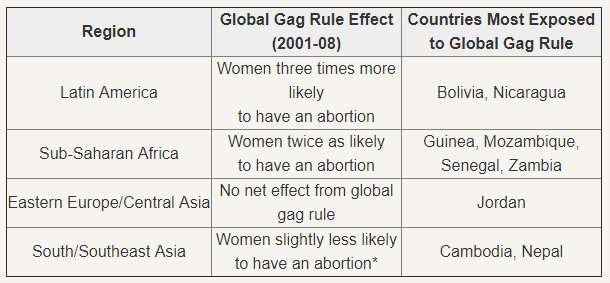How the global gag rule affects women's health
President Trump reinstated and expanded the global gag rule with the goal of reducing abortions, but new research suggests the policy could do the opposite. A study by Rutgers University Professor Yana Rodgers finds that women in Latin America and Africa were up to three times more likely to have an abortion when the rule was in effect under President George W. Bush. The findings appear in Rodgers' new book, The Global Gag Rule and Women's Reproductive Health.
"The global gag rule causes more abortions, not fewer," Professor Rodgers said. "When the U.S. cuts off a critical stream of funding, some healthcare clinics in developing countries are forced to reduce staff or shut down altogether. This makes it harder for women living in those areas to get contraception. The result is more unintended pregnancies and more abortions."
First implemented by President Reagan in 1984, the global gag rule—officially known as the Mexico City Policy—cuts funding to foreign nongovernmental organizations (NGOs) that perform abortions or discuss the option of abortion with patients. Over the last 35 years, every Democratic president has rescinded the policy and every Republican president has reinstated it.
To measure the rule's impact, Rodgers analyzed Demographic and Health Survey data from 51 developing countries, covering about 6.3 million women per year. Using a rigorous statistical method known as regression analysis, she calculated women's likelihood to have an abortion before and during the most recent reinstatement period for which data are available (2001-08). Her key findings appear in the table below.

Announced on January 23, 2017, President Trump's version of the global gag rule goes further than past incarnations. In addition to losing their family planning assistance, foreign NGOs that perform or promote abortions now lose U.S. funding for prenatal and postnatal care; prevention and treatment of HIV/AIDS, malaria, Zika virus, and other diseases; screenings for cervical cancer and sexually transmitted diseases; immunizations; and nutrition services.
"The Trump Administration's expanded version of the global gag rule is likely to have adverse effects on a dashboard of health indicators for women, men, and children," Rodgers said. "The policy puts $8.8 billion in global health funding at risk, up from about $600 million. We're talking about the whole pie, not just a slice."
Digging deeper into women's reproductive health outcomes, Rodgers finds no conclusive or consistent evidence that a country's own restrictive abortion laws actually reduce the number of abortions. If anything, she finds that restrictive laws are associated with more unsafe abortions and greater maternal mortality in many developing countries.
"The research is clear," Rodgers said. "Women will find a way to have an abortion if they need to, even if it is illegal and in unsafe conditions."















